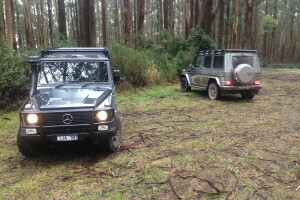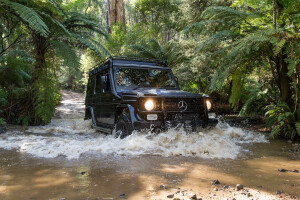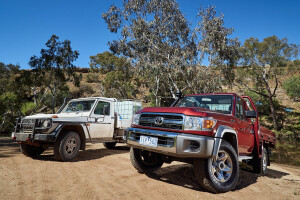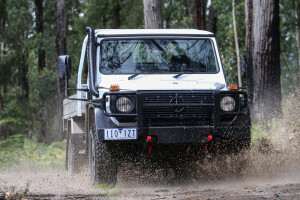Latest Review
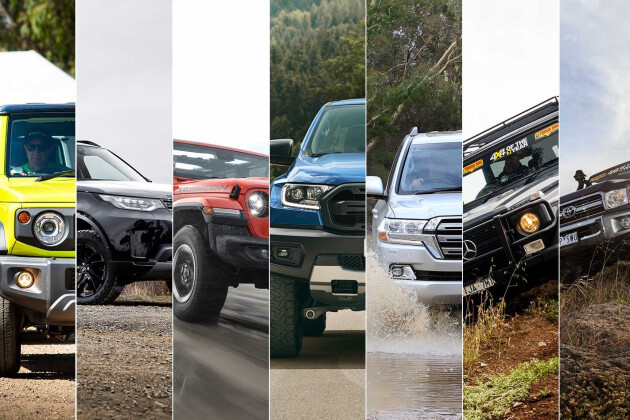
2019's best new off-road 4x4s
Keen to head straight from the showroom to serious off-road tracks with only a tyre stop along the way? These are the seven best 4x4s money will buy.
IMAGINE you have all the new 4x4 dealerships you could wish for, all closely grouped together in some remote and rugged location. All you have to do is walk into one and pick a new off-road capable 4x4 to drive back home … home being hundreds of kilometres away via the roughest tracks imaginable. In some parts there may not be tracks at all.
You can’t modify your chosen vehicle as there are no engineering workshops among all the new dealerships, but factory options are available. And there’s a well-stocked tyre shop, so you can swap to more off-road-friendly tyres provided you stay legal (we know state regulations vary, so for argument’s sake let’s say NSW). So what new 4x4 would you pick if price wasn’t an issue?
It may be a fanciful scenario, but it’s the thinking behind compiling this list of the most off-road-capable showroom-stock 4x4s, listed one to seven on their ability to cover any type of off-road terrain you can imagine: soft sand, slick mud, ruts, holes, rocks, steep climbs and descents, or any combination of the same.
The seven are: Jeep Wrangler Rubicon, Toyota Land Cruiser 70 Series, Mercedes-Benz G-Class Professional, Ford Ranger Raptor, Toyota Land Cruiser 200 Series, Land Rover Discovery and Suzuki Jimny.
Jeep JL Wrangler Rubicon - Original and still the best
All Jeep Wranglers are capable 4x4s, but the Rubicon is the best of the lot.
IS THERE currently a more iconic 4x4 available than the Jeep Wrangler Rubicon? Not only is the Rubicon the most off-road-capable vehicle in the Wrangler range, but it’s also the latest hero vehicle in a long line of 4x4s born of the original World War Jeep, the most iconic 4x4 of all time.
Big call? Then here’s a quick history lesson: If it wasn’t for the original WWII Jeep there would be no Land Rover, Toyota Land Cruiser or Nissan Patrol as we know them today. End of story.
Fast forward to 2019 and the latest iteration of this iconic 4x4 has just arrived in Australia. The new Wrangler JL replaces the Wrangler JK that dates back more than a decade now. The JL brings new powertrains and changes in engine availability, most notably in the Rubicon which is now available with a diesel engine.
In fact, it’s the only model in the new range that has a diesel. The diesel in question comes from Fiat Powertrain Technologies and has been used previously in the KL Cherokee and a couple of Alfa Romeo models, the Giulia RWD sedan and the Stelvio SUV. It’s a Euro 6-compliant (and therefore ahead of the game here) 2.2-litre four-cylinder (single) turbo-diesel that makes a punchy 147kW and 450Nm despite its relatively small capacity.
The JL Rubicon is still offered with a petrol engine: a 3.6-litre Pentastar V6 that claims 209kW and 347Nm and is carried over from the JK Rubicon. The petrol engine is a good, relatively modern design (without being cutting edge) that’s $5000 cheaper than the diesel, and it’s simpler and cheaper to service so it makes a strong buy-me argument even if the diesel is more economical and the better drive.
In another significant JL Series change, a manual gearbox is a thing of the past as all new Wranglers are automatic-only. That may be bad news to some, but the good news is the gearbox in question is the ZF eight-speed (made under licence by Chrysler, in this case), arguably the best automatic on the planet.
More changes come in the form of the JL’s transfer case. While both the old Rubicon and the new Rubicon get what Jeep calls the Rock-Trac transfer case, the new Rubicon’s Rock-Trac is based on Jeep’s Selec-Trac transfer case (with its full-time 4x4 mode) while the old Rubicon’s Rock-Trac was based on the Jeep’s part-time 4x4 Command-Trac transfer case. What makes both Rock-Trac systems the same is the 4.0:1 low-range reduction ratio in place of the 2.72:1 low-range reduction ratio in the non-Rubicon models.
All Wrangler models also get newly calibrated, off-road-specific electronic traction control.
These changes aside, the new Rubicon carries over the defining elements of the old Rubicon, namely front and rear driver-switched differential locks and a front swaybar release which, when activated, adds to the already impressive front wheel travel.
The Rubicon also gets lower axle ratios compared to non-Rubicon models and impressive 77.2:1 (with the petrol Rubicon) and 70.3:1 (with the diesel) crawl ratios. Last, but certainly not least, are the BFGoodrich 32-inch KM3 mud-terrain tyres.
Like the Ranger Raptor, the Rubicon is a genuine factory custom pitched at off-road use and is arguably the best out-of-the-box 4x4 you can buy if getting seriously dirty is your idea of fun. Just the fact it’s a separate-chassis design with live axles at both ends puts it in a good place before you start.
Only one thing could be better and that’s a short wheelbase two-door Rubicon thanks to its notably better ramp-over angle. As it is, the ‘shortie’ Wrangler is only available as a Sport or Overland model.
Jeep JL Wrangler Off-Road Accessories
If you're not satisfied with what a stock Rubicon has to offer, there's no shortage of off-road specific 4x4 aftermarket kit available to make it even more capable. Obvious mods start with suspension lift and bigger wheel/tyre packages but extend well beyond that, snorkels included.
However, it's worth noting that Australian-spec Rubicons, with their Selec-Trac-based transfer case, use lighter-duty axles than their US counterparts, which means an axle upgrade if you want to run bigger tyres without compromising reliability.
JEEP JL WRANGLER RUBICON SPECS:
Engine: 2.2-litre 4-cyl turbo diesel
Max Power: 147kW @ 3500rpm
Max Torque: 450kW @ 2000rpm
Gearbox: Eight-speed automatic
4x4 System: Dual-range/full-time (+2wd)
Crawl Ratio: 70.3:1
Construction: Separate-chassis
Front Suspension: Live-axle/coil springs
Rear Suspension: Live-axle/coil springs
Kerb Weight: 2221kg
GVM: 2630kg
Departure Angle: 31.9°
Ramp-over Angle: 21.2°
Approach Angle: 41.7°
Wading Depth: 760mm
Ground Clearance: 252mm
Fuel Tank Capacity: 81 litres
ADR Fuel Claim: 7.5L/100km
Toyota Land Cruiser 70 Series - Global Force
No Toyota 4x4 is tougher than the 70 Series.
THE 70 SERIES, currently sold as a 76 Series wagon, 78 Series TroopCarrier and 79 Series single- and double-cab utes, is the latest in a long line of Toyota 4x4s that trace back to the very first Land Cruiser; although, it wasn’t called that at the time.
It was the ‘BJ’, where B stood for Toyota’s B Series diesel engine and J for Jeep, a name used then in the generic sense but subsequently changed to Land Cruiser when Willys-Overland, owners of the Jeep name, pressed for trademark violation, for which Toyota apologised. Lost in the translation, perhaps?
The BJ became the 20 Series, which led to the 40 Series (the Land Cruiser that cemented Toyota’s 4x4 credentials not just here in Australia but globally) and then the 70 Series that arrived here in 1985.
This line from BJ, 20, 40 and 70 is the commercial – working vehicle – heart of the Land Cruiser family tree, while the two other Land Cruiser family branches – 60/80/100/200 and 90/120/150 – are offshoots for the passenger 4x4 market.
This is an important distinction and the reason why the 70 has live axles at both ends (the only current Toyota 4x4 to do so) and leaf springs at the rear (the only current Land Cruiser to do so). The 70 is also the only one of the seven vehicles on this list to have leaf springs at the rear.
Just about any current 70 – 76 wagon, a 78 TroopCarrier or one of the 79 utes – could fill this spot, but we have gone for the 79 double-cab due to the functionality that a ute always brings in the bush over a wagon.
Feel free if you like to make an argument for a 76 thanks to its notably shorter wheelbase (450mm shorter than a 79), or for the TroopCarrier for its extra 50 litres of fuel capacity over the 130-litre capacity of all non-78 Series models.
Models not applicable include lower spec (WorkMate) 76s, 78s and single-cab 79s, as these variants don’t come with the driver-switched front and rear lockers, even as options. And the factory lockers are a significant part of the 70’s off-road armoury.
All 70s have the same dual-range, part-time 4x4 system with a more-than-handy 44:1 crawl ratio, and it’s the only vehicle here that doesn’t come with an automatic gearbox, another telltale of its commercial, working-vehicle persona.
The 70’s tough underpinnings, generous ground clearance and good vision from its upright, truck-like cabin underpin its formidable off-road prowess. The live axles also provide decent wheel travel, although not as good as some here. That’s where the factory lockers come to the fore.
Mind you, the ‘Active Traction Control’ (A-TRC), specifically tuned for off-road rather than on-road use, works very well. Toyota, along with Jeep and Land Rover have led the way with the evolution of electronic traction control away from just an on-road safety benefit to a serious off-road enhancement.
All 70 Series also get a snorkel as standard, which is just another reason why the 70 is an exceptional go-anywhere 4x4. In fact, the snorkel makes the claimed wading depth of 700mm seem conservative.
While no 70 Series comes with aggressive off-road rubber as standard, the factory 16s (in alloy or one-piece steel) allow plenty of flexibility in replacement rubber in the standard sizes (265/70 or 225/95), or bigger.
Toyota LC79 Off-Road Accessories
Want to make your 70 better than it is, beyond a change of wheels and/or tyres and bar work? Well, you have no shortage of options, all available via the local 4x4 aftermarket. Feel free to benefit from a number of suspension upgrades, lifts included, or more exotic things like portal axles.
Or you can unleash the largely untapped potential from the 4.5-litre V8 diesel, best let loose on the world by replacing the annoyingly short-geared five-speed manual with a heavy-duty (US-sourced) automatic gearbox. In terms of making an extra-special 70, the sky is the limit.
TOYOTA LC79 SERIES DC SPECS:
Engine: 2.2-litre 4-cyl turbo diesel
Max Power: 147kW @ 3500rpm
Max Torque: 450Nm @ 2000rpm
Gearbox: Five-speed manual
4x4 System: Dual-range part-time
Crawl Ratio: 44.1:1
Construction: Separate-chassis
Front Suspension: Live-axle/coil springs
Rear Suspension: Live-axle/coil springs
Kerb Weight: 2190kg
GVM: 3300kg
Departure Angle: 29°
Ramp-over Angle: N/A
Approach Angle: 35°
Wading Depth: 700mm
Ground Clearance: 235mm
Fuel Tank Capacity: 130 litres
ADR Fuel Claim: 10.7L/100km
Mercedes-Benz G-Class Professional - Tough as teak
The G-Wagen might carry a fancy Euro nameplate mainly associated with luxury and performance, but it’s military-grade tough.
MERCEDES-BENZ’S Gelandewagen, or G-Class, has been in production in one form or another since the hand-built ones were first assembled in 1975, which is a notable achievement in anyone’s books.
More surprising is that until the recent arrival of the new-generation model with the independent front suspension (IFS), the G-Wagen hasn’t changed all that much outside of the inevitable evolution in powertrains.
This is particularly true of the G-Wagen Professional, which sells alongside the new-generation, IFS-equipped G-Wagen, which is only available in a high-performance AMG variant with a twin-turbo petrol V8 that has more power and torque than you can jump over, and a price tag to match.
The G-Wagen Professional is at the other end of the scale power-wise, with its detuned 3.0-litre V6 diesel mustering just 135kW but with the ability to run on the lowest-grade diesel you’ll find anywhere in the world. And it’s less than half the price of the hot-rod AMG version.
Just who needs 430kW and 850Nm in something like a G-Wagen is anyone’s guess, but it does sell better than the far more sensible, functional and cheaper Professional model.
Don’t be fooled by the Professional tag, as this isn’t a G-Wagen pitched at ‘professionals’ as we may know them – well-heeled lawyers, doctors, etc. – but a civilian version of the G-Wagens being supplied to the Australian Defence Force, so that means a very back-to-basics vehicle.
The G-Wagen was originally conceived for military use as an all-purpose light transport anyway, while the civilian G-Wagen was first offered here in 1983 but withdrawn from sale five years later.
The G-Wagen has a dual-range full-time 4x4 system with a mechanical centre diff. All three diffs are lockable via driver-operated switches. Add in the G-Wagen’s lofty clearance and robust light-truck all-terrain tyres (265/70s on 16s) and it’s a genuine off-road vehicle capable of making its own way without the help of a trail. It also comes with a snorkel and bullbar as standard, the only vehicle in the seven thus equipped. It’s got a super solid front bash plate, too.
While the G-Wagen has live axles at both ends there’s still not a great deal of wheel travel, so the front and rear lockers come in handy on severe terrain as the G-Wagen will cock up a wheel or two in conditions where you wouldn’t think it should.
And while it does have electronic traction control, once you lock the centre diff, which is the first thing you do off-road, it cancels the traction control. Then it’s a matter of locking the rear diff, and then the front diff if things get really gnarly.
If anything, the G-Wagen’s weakness is soft sand due to its pretty ordinary power-to-weight ratio, the poorest of the seven vehicles on this list. Still, that’s unlikely to stop you, but it would be the first on this list to use low range for sand driving.
Despite that, the G-Wagen is a true ‘compass-bearing’ overland tourer straight out of the box … arguably the best of our seven in that role.
Mercedes-Benz G-Class Off-Road Accessories
You really don't have to toughen up the G-Wagen as it's already built like a reinforced brick dunny. And there's not much it needs, given it comes with a snorkel, standard bullbar and robust off-road tyres.
If you do want more you can add a winch, a cyclone air-filter atop the snorkel, a second spare wheel carrier and a walk-on bonnet straight from the factory options list. More specialist kit is available overseas, but it's a bare cupboard from the local 4x4 aftermarket industry given the low sales volume of this model.
MERCEDES-BENZ G-CLASS SPECS:
Engine: 3.0-litre V6 turbo diesel
Max Power: 135kW @ 3800rpm
Max Torque: 400Nm @ 1600-2600rpm
Gearbox: Five-speed automatic
4x4 System: Dual-range full-time
Crawl Ratio: 35.6:1
Construction: Separate-chassis
Front Suspension: Live-axle/coil springs
Rear Suspension: Live-axle/coil springs
Kerb Weight: 2350kg
GVM: 3560kg
Departure Angle: 35°
Ramp-over Angle: 22°
Approach Angle: 38°
Wading Depth: 650mm
Ground Clearance: 245mm
Fuel Tank Capacity: 97 litres
ADR Fuel Claim: N/A
Ford Ranger Raptor - Strike Weapon
The Raptor isn’t just a dressed-up Ranger … it’s a seriously re-engineered factory custom.
YOU CAN thank the tremendous – Hilux-challenging – sales success of the bread-and-butter Ford Ranger for the creation of the Ranger Raptor.
With the cash registers ringing, Ford could splurge on the Raptor in terms of development investment without worrying too much if it would make a profit in its own right. And, profit or not, it was always going make a statement not only as the hero model in Ford showrooms but something the likes of Toyota (with its Hilux) or Holden (with its Colorado) had no answer for.
The Raptor was created by Ford Australia with help from Ford Performance, Ford’s global high-performance division. But it’s not engine performance that Ford chased with the Raptor, it was chassis performance.
To that end the Raptor’s underpinnings have been significantly altered from a standard Ranger and start with 150mm-wider front and rear tracks via different front A-arms and a different rear axle housing.
The rear axle gets coil springs rather than leaf springs and a Watt’s link for lateral location, a far superior arrangement in terms of chassis control compared to the commonly used – cheap and simple – Panhard rod. Longitudinal rear axle location is via upper and lower trailing arms.
Bespoke Fox-brand racing-technology bypass dampers (the rears have ‘piggy-back’ reservoirs) are used all around, with the new suspension bringing 30 per cent more travel at both ends and 46mm more ground clearance. Four-wheel disc brakes and 285/70 R17 BFGoodrich KO2 light-truck all terrains complete the chassis package.
For a ‘hero’ ute, it may come as a surprise that the Raptor uses a standard Ranger powertrain, lower final-drive gearing aside. That means the same 2.0-litre four-cylinder bi-turbo-diesel and 10-speed automatic you’ll find in Ranger XLT and WildTrak models, rather than the long-serving 3.2-litre five-cylinder and six-speed that’s available across the range.
The change to the 11-per-cent-lower final drive gearing may sound like a performance gain in terms of snappier acceleration, but it’s there more to compensate for the Raptor’s taller wheel and tyre package that would otherwise leave it over-geared if not for the lower final drive.
The Raptor retains the Ranger’s part-time 4x4 system, complete with a driver-switched rear locker. When the rear locker is engaged the electronic traction control (ETC) stays active on the front axle, which is an important weapon in the Raptor’s off-road armoury.
With many of the current crop of 4x4 utes with a driver-switched rear locker, engaging the locker cancels the ETC on both axles; which is a win-lose situation, not a win-win as it is with the Raptor.
The Raptor’s drivetrain differs from a standard Ranger with paddle shifters for ‘manual’ gear selection and via its ‘Terrain Management’ system, which has Normal, Sport, Grass/Gravel/Snow, Mud/Sand, Baja, and Rock modes.
All modes bar Rock are available in high range, while all modes bar Sport and Grass/Gravel/Snow are available in low range, which is the way it should be. These different modes vary the engine throttle-mapping, gearbox shift protocols and the traction and stability control calibration.
With its extra ground clearance, long wheel travel, effective 4x4 system and decent off-road tyres (straight out of the box), the Raptor is highly effective in any 4x4 system, even if its long wheelbase can be an issue in some situations.
And while the Raptor is more than capable in difficult going, you could probably argue it would do its best work on higher speed desert tracks and the like. It’s hard to see any of the others matching it in that regard.
Ford Ranger Raptor Off-Road Accessories
There's not much to do a Raptor given the factory has already done all the chassis work for you. If you're going to change it, you will need to know what you're doing. Heavy-duty front recovery points and heavy-duty rear recovery points integrated into the standard towbar are there already, while the rear of the chassis has also been modified to carry a 285/70R17 spare, which is a nice touch.
Despite the impressive wading depth, he engine's air intake is under the bonnet lip, so a snorkel would be a good investment, as would a bullbar; although, that goes without saying. The more vexed question is: What to do with the engine? More grunt would certainly be more than welcome, but, given the engine is already in a high state of tune, there's not a great deal of potential left in extracting more power.
Sure, it's possible, but at what cost to engine reliability?
FORD RANGER RAPTOR SPECS:
Engine: 2.0-litre 4-cyl bi-turbo diesel
Max Power: 157kW @ 3750rpm
Max Torque: 500Nm @ 1750-2000rpm
Gearbox: 10-speed automatic
4x4 System: Dual-range part-time
Crawl Ratio: 47.6:1
Construction: Separate-chassis
Front Suspension: Independent/coil springs
Rear Suspension: Live-axle/coil springs
Kerb Weight: 2332kg
GVM: 3090kg
Departure Angle: 24°
Ramp-over Angle: 24°
Approach Angle: 32.5°
Wading Depth: 850mm
Ground Clearance: 283mm
Fuel Tank Capacity: 80 litres
ADR Fuel Claim: 8.2L/100km
Toyota Land Cruiser 200 Series - Off-road Limousine
If it is comfort and off-road ability you desire, then it’s near impossible to go past a 200 Series Land Cruiser.
THE 200 Series is coming up for replacement, so if you want one you might need to be quick. In fact, it’s somewhat of a surprise that the 200 hasn’t already been superseded. Not that there’s anything wrong with the 200 to warrant replacement, but 12 years is a longer-than-usual product lifecycle even in this slow-turnover sector of the new-car industry.
When the 200’s replacement will arrive is still up in the air, but it may not be far off. The exact timing (at least for Australia) probably depends on the still undecided implementation dates for Euro 6 emission regulations, which will affect how much re-engineering is needed with the existing powertrains, or the possible need for new powertrains down the track. Perhaps if Nissan offered a diesel engine for its otherwise impressive Y62 Patrol (itself nine years old), then the extra competition across all global markets may have pressured Toyota to move with more haste.
Speculation about the 200’s replacement aside, the 200 is a formidable off-road weapon with nothing more than a tyre swap. Even on the showroom 17s (GX and GXL) it’s still more than handy, but you can do much better with replacement rubber in terms of off-road grip, durability and size.
The 200 is better served by its 4.5-litre diesel V8 rather than by its 4.6-litre petrol V8 on fuel consumption and range, especially in more difficult off-road driving. For highway cruising the petrol V8 doesn’t give much away to the diesel in regards to fuel use, but work them both hard in low range or in soft sand and the disparity in consumption and therefore range becomes quite significant. The petrol engine is still the winner in terms of power, refinement and service simplicity.
If you’ve settled on the diesel then the next choice with the 200 is more vexing. At first glance the base-model GX is the pick of the range off-road given it has a snorkel as standard, is not hindered by side-steps and is the lightest variant (no third-row seats for starters), which is an advantage (no matter how small) on soft sand and the like. A problem with the GX is that it’s not available with the Kinetic Dynamic Suspension System (KDSS), even as an option. To get KDSS you have to move up to a GXL (arguably the pick of the range for that reason).
KDSS might sound like marketing hype, but the reality is that it gives considerably more wheel travel off-road by automatically relaxing the swaybars, while keeping the swaybar tensioned for on-road driving.
KDSS is highly effective and brilliantly simple – it’s essentially a hydro-mechanical system, so it’s also robust. Higher spec VX and Sahara models also have KDSS but add more weight, and while the top-spec models also bring Multi-Terrain select, the advantage here is marginal at best. The higher spec 200s also come in 18s, so another off-road negative in terms of showroom-stock presentation.
KDSS further enhances what is the 200’s trump card, namely its supple, long-travel suspension, independent front and all. There’s no front or rear lockers, but the Crawl Control (a special programme for the electronic traction control) works a treat to get you out of any sticky situation.
The Crawl Control even modulates the throttle and all traction protocols, so all you need to do is steer. Otherwise, the 200 is reasonably standard fare with dual-range full-time 4x4 via a mechanical limited-slip (Torsen) centre diff that is lockable via a driver-operated switch.
If anything lets the 200 down off-road it is ground clearance and ramp-over, which could be better in both cases.
Toyota Land Cruiser 200 Series Off-Road Accessories
If you want more than a showroom 200 can offer - even on decent off-road rubber - then you're in for a treat as there's no shortage of upgrades, all of which are available from the Australian 4x4 aftermarket.
Wheels, tyres and suspension upgrades and lifts are the obvious places to start. After that you can move onto lockers, a snorkel, bar work, long-range tanks and underbody protection.
TOYOTA LAND CRUISER 200 SPECS:
Engine: 4.5-litre V8 twin-turbo diesel
Max Power: 200kW @ 3600rpm
Max Torque: 650Nm @ 1600-2600rpm
Gearbox: Six-speed automatic
4x4 System: Dual-range full-time
Crawl Ratio: 34.1:1
Construction: Separate-chassis
Front Suspension: Independent/coil springs
Rear Suspension: Live-axle/coil springs
Kerb Weight: 2740kg (nominal)
GVM: 3350kg
Departure Angle: 24°
Ramp-over Angle: 21°
Approach Angle: 32°
Wading Depth: 700mm
Ground Clearance: 230mm
Fuel Tank Capacity: 138 litres
ADR Fuel Claim: 9.5L/100km
Land Rover Discovery - Techno wizardry
Proving that old-school isn’t the only school when it comes to getting serious.
IF LAND Rover had stayed with its numbering system this Discovery would be a Discovery 5, the fifth model in a line that dates back to 1989.
Ironically, the first Discovery and the subsequent Discovery II would be at home in this group, as both are built on a separate chassis, a feature common to all of the seven vehicles here bar the current Discovery. Those first two Discovery models also had live axles back and front, a suspension arrangement that is also the most common among the vehicles here.
To say that the Discovery stands out in this group would be a huge understatement. Significantly, it’s the only 4x4 here not to have a separate chassis. Its monocoque body isn’t even fabricated from steel but largely from aluminium alloy.
On top of that the Discovery is the only one of our seven vehicles with fully independent suspension. Setting it further apart are air-springs, which provide adjustable ride height and serious ground clearance if need be.
Serving the Discovery well is the fact it’s built on Land Rover’s premium platform used with the current Range Rover and Range Rover Sport models and introduced off the back of a huge investment in 2014. Land Rover has then strengthened that platform by swapping from aluminium alloy to steel for the suspension sub-frames and adding more ride-height adjustment to the air suspension.
The Discovery also stands out in this company for having high-speed road tyres that are the least suited to off-road use, so a stop at the tyre shop before you head anywhere is mandatory. The good news is that this generation Discovery carries a taller tyre for any given wheel size than the previous generation (Discovery 4), which gives you more to play with when selecting off-road-friendly rubber.
With tyres sorted you can start to appreciate what the Discovery has to offer off-road, which is considerable. For a vehicle with fully independent suspension it has plenty of wheel travel, better even than the Mercedes G-Wagen, which has live axles at both ends.
Crank the air suspension right up and the Discovery also has as good, if not better, ground clearance than any vehicle here, which is reflected in the fact that its wading depth claim (900mm) is the best of these, too.
The Disco may not be comfortable to drive on rough ground for any length of time on the highest suspension setting, but at least it’s there to get you over a gnarly bit that could otherwise stop other vehicles here.
The Discovery has the ‘smartest’ 4x4 system that requires the least intervention from the driver thanks largely to its self-locking centre differential that can also proportion the drive front-to-rear as needs be.
All of the other vehicles here with centre diffs require them to be locked by the driver, or they don’t have a centre diff as they are part-time 4x4 so you have to engage 4WD. Either way, there’s no front-to-rear drive proportioning as with the Discovery. The Discovery’s rear locker (an inexpensive $1110 factory option) also locks automatically, where the rear lockers on other vehicles (where fitted) require driver intervention.
The other trick up the Discovery’s sleeve is that it’s the lightest of the seven vehicles bar the Jimny, which helps on any soft surface and when climbing a slippery slope.
In fact, the Discovery is more than 600kg lighter than the Land Cruiser 200, the nearest comparable vehicle here. This is the benefit of its aluminium-alloy monocoque body. Of all the vehicles here the Discovery has the best power to weight, which is handy in soft sand and the like.
Land Rover Discovery Off-Road Accessories
The key problem with the Discovery's stock tyres is their high-speed rating (270km/h) and the associated thin and fragile - just waiting to be punctured - sidewalls.
Adding off-road tyres to the factory 19s is theoretically the best bet, but the scarcity of suitable 19-inch rubber means you're better off with 20-inch wheels (standard on HSE) as there is a wider choice in off-road rubber, especially if you go up one size to a 275/55R20. The aftermarket 18-inch wheels available for the Discovery 4 should also work on this Discovery (same brake sizes), which gives even wider tyre choice.
Otherwise, the cupboard is pretty bare for Discovery off-road accessories, so you'll need to hunt around amongst the Land Rover specialists here and overseas.
LAND ROVER DISCOVERY SPECS:
Engine: 2.0-litre 4-cyl bi-turbo diesel
Max Power: 177kW @ 4000rpm
Max Torque: 500Nm @ 1500rpm
Gearbox: Eight-speed automatic
4x4 System: Dual-range full-time
Crawl Ratio: 45.7:1
Construction: Monocoque
Front Suspension: Independent/air springs
Rear Suspension: Independent/air springs
Kerb Weight: 2019kg
GVM: 2940kg
Departure Angle: 30°
Ramp-over Angle: 27.5°
Approach Angle: 34°
Wading Depth: 900mm
Ground Clearance: 283mm
Fuel Tank Capacity: 77 litres
ADR Fuel Claim: 6.3L/100km
Suzuki Jimny - Mighty midget
Suzuki’s new Jimny might look very urban cool, but it’s still bush-ready and able.
THE WORLD is lucky that Suzuki decided to build this latest Jimny and continue a rich 4x4 history that dates back some 50 years. Suzuki’s probably happy, too, that it produced this new Jimny, as it’s selling very well indeed; no doubt helped by the fact there’s nothing else even remotely like the Jimny on the market today. What else is this off-road capable, brick-dunny tough, city friendly and affordable?
Despite the flash new body, the Jimny is still a seriously old-school 4x4, as old-school as any of our seven (bar the LC70) thanks to its separate chassis and live axles back and front. This new Jimny has a 1.5-litre (four-cylinder petrol) engine (replacing the previous 1.3-litre engine), but is marginally heavier, wider and taller, and it rides on a wider track and on skinnier tyres.
The ‘new’ body looks old in some ways, with styling that harks back to the Jimny’s forebears from the 1970s: the LJ10, LJ20 and LJ50, the model that kicked off the success of the diminutive Suzuki here in Australia.
We aren’t entirely happy ranking the Jimny at number seven on this list because in some off-road environments it would be the most useful 4x4 here, even if it needs bigger, off-road-specific tyres. The standard 195/80R15s are too small and effectively a road-pattern tyre.
Soft sand or mud both come to mind as off-road environments where the Jimny has a distinct advantage in this company due to being so light, less than half the weight of most of the other vehicles in the seven. Less weight means less of a tendency to sink into any soft surface – everything else, namely tyre contact patch area, being the same – hence the need for a bit more rubber under the little Suzuki.
The Jimny’s light weight also means the modest 75kW from the 1.5-litre engine translates to a power-to-weight ratio that’s better than a few of the other vehicles here, a factor that again helps in soft sand.
The Jimny’s other off-road party trick is its short wheelbase and extraordinarily steep approach, ramp-over and departure angles. Confronted with a sharp gully with steep entry or exits, or a steep mound to traverse, the Jimny is at a distinct advantage in this company.
Otherwise the Jimny is pretty straightforward in terms of its part-time 4x4 system, which has reverted back to lever operation. No diff locks as standard and while Jimny does have an electronic traction control (introduced in the final three years of the previous generation Jimny) its calibration seems more on-road than off-road specific.
The Jimny is the only one of our seven vehicles that’s available with the choice of manual and automatic gearboxes. Most of the others are automatic only, while the Land Cruiser 79 is manual only.
Unfortunately, the five-speed manual and the four-speed automatic transmissions are carried over from the previous generation Jimny and are arguably the weak link in this new model.
On paper, the manual might seem like the pick of two ’boxes thanks to its better driver ‘control’ and a lower crawl ratio, but the automatic’s gearing multiplier effect, courtesy of its torque convertor, makes it a better climber on steep tracks. The automatic also works better in soft sand.
Suzuki Jimny Off-Road Accessories
If showroom stock plus decent tyres doesn’t keep you happy, then there’s a plethora of off-road-specific upgrades for the Jimny through Suzuki specialists, none better than Melbourne-based Piranha Off Road Products.
You can swap the stock 15s for 16s, which opens up the choice of bigger off-road tyres and you can think about a suspension lift, or a body lift, or both, all made easy by the Jimny’s live-axle suspension and body-on-frame construction. Items such as snorkels, diff breathers, diff locks, heavy-duty axles, tank guards and lower-geared transfer cases are all readily available.
SUZUKI JIMNY SPECS:
Engine: 1.5-litre 4-cyl petrol
Max Power: 75kW @ 6000rpm
Max Torque: 130Nm @ 4000rpm
Gearbox: Four-speed automatic
4x4 System: Dual-range part-time
Crawl Ratio: 32.7:1
Construction: Separate-chassis
Front Suspension: Live axle/coil springs
Rear Suspension: Live axle/coil springs
Kerb Weight: 1090kg
GVM: 1435kg
Departure Angle: 49°
Ramp-over Angle: 285°
Approach Angle: 37°
Wading Depth: N/A
Ground Clearance: 210mm
Fuel Tank Capacity: 40 litres
ADR Fuel Claim: 6.9L/100km
News
-
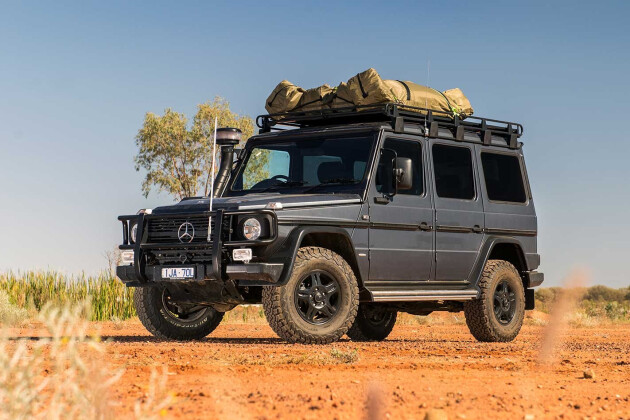 News
NewsMercedes-Benz G-Professional pulled from Australian market
End of the line for G-Pro wagon and cab-chassis in Australia.
-
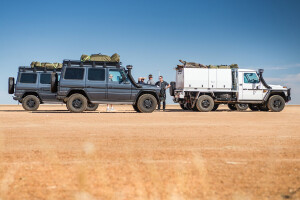 News
NewsMercedes-Benz G300 CDI Professional pricing confirmed
Benz locks in Aussie pricing for the heavy duty G-Professional wagon and cab-chassis models.
-
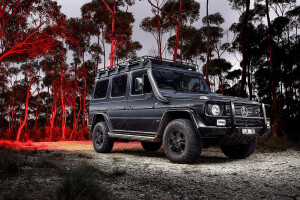 News
News2017 Mercedes-Benz G300 CDI Professional wagon available in Australia
Australia is the only country to get Benz’s hard-as-nails military wagon in civilian clothes
-
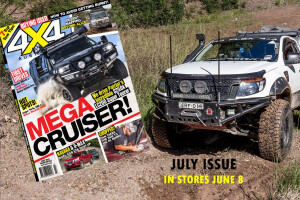 News
News4X4 Australia: July 2017 issue out now!
All-new Isuzu MU-X, Navara and D-MAX duke it out, a crazy custom F250, and loads more.



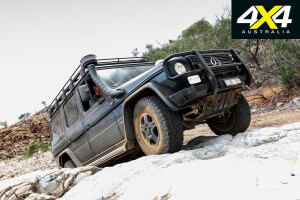
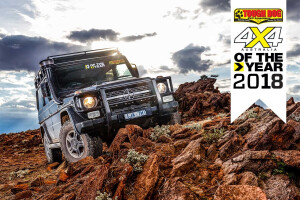
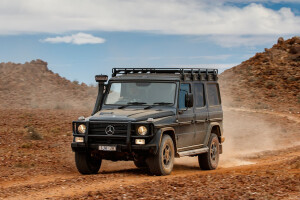
.jpg)
